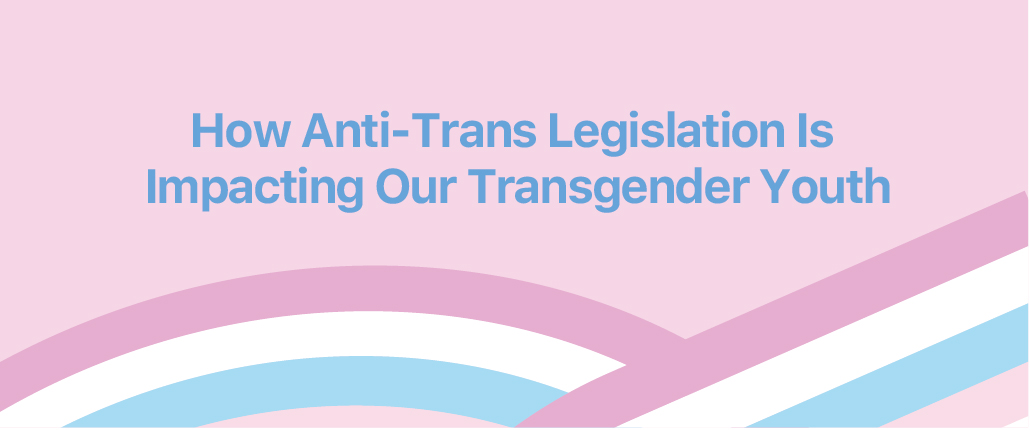
How Anti Trans Legislation is Impacting our Transgender Youth
By Jay Baldwin
The American Civil Liberties Union is currently tracking nearly 500 anti-LGBTQ bills in the United States that have been introduced since the start of 2023. It is staggering to realize that this already is nearly twice the number of anti-LGBTQ bills that were introduced just one year ago in 2022. Despite the existence of the First Amendment, which affords us the right to free expression, many politicians are determined to stomp on free speech and expression for LGBTQ people, limiting access to books about the community and trying to ban or censor performances like drag shows. When it comes to the transgender and gender diverse community, many of these bills aim to restrict or eliminate entirely transgender youth’s access to trans affirming health care, ability to participate in sports that align with their gender identity, or their ability to be fully protected and included in school wide policies. In the first half of 2023 alone, 19 states have enacted bans or significant new restrictions on gender-affirming care for minors, most ending the use of cross-sex hormones and puberty blockers. For the first time in its four-decade history, the Human Rights Campaign has declared a National State of Emergency of LGBTQ+ Americans.
With so much of this legislation specifically targeting the transgender community, it goes without saying that these measures have had significant mental health tolls on our young people. The Trevor Project’s 2023 U.S. National Survey on the Mental Health of LGBTQ Young People captures the experiences of more than 28,000 LGBTQ young people ages 13 to 24 across the United States. Nearly 1 in 3 LGBTQ young people said their mental health was poor most of the time or always due to anti-LGBTQ policies and legislation. Over 40% of LGBTQ young people seriously considered attempting suicide in the past year—and young people who are transgender, nonbinary, and/or people of color reported higher rates than their white cisgender LGBTQ peers.
With such stark statistics, it can be easy to feel helpless. And yet, even in the face of this national state of emergency for LGBTQ people, and our trans youth specifically, there are still encouraging statistics. LGBTQ young people who had access to affirming homes, schools, community events, and online spaces reported lower rates of attempted suicide compared to those who did not. If you know a youth who is in need of mental health support through individual counseling, don’t hesitate to inquire about our LGBTQ+ affirming therapy services by filling out this form.
In addition, sexual minorities who participate in LGBTQ activism tend to have enhanced psychological well-being. Kaleidoscope is proud to offer our LGBTQ+ and neurodiverse young people an opportunity to work together and make meaningful contributions to their LGBTQ+ community through the Youth Council Leadership Program. Youth leaders serve for 2 hours per month and help Kaleidoscope plan social events for youth, give us feedback on our services, and contribute ideas for future programming.
And lastly, if you or a youth you know is in immediate crisis or just needs a supportive listener, the Trans Lifeline Hotline is a peer support phone service run by trans people for our trans and questioning peers.
Looking for other ways to support transgender youth?
Check out A Guide to Being an Ally for Trans and Non Binary Youth.
From all of us at Kaleidoscope, we want our Trans community to know that we see you, we hear you, and we uplift your stories and voices.
